Question:
I have a question about your recent class. It was right at the end when you were saying something about how if you are not a pure devotee you should not be trying to teach people about Krishna. I’m not sure of the exact wording, so that’s probably wrong, but that was the essence, I think. Anyway, so I wondered, where does that put someone like me, who has only a tiny bit of knowledge, but at least from a real pure devotee, when I talk to people I meet about Krishna? I have this big desire to want to give Krishna to them, to share the things that I know so they can get some benefit. Is it okay that I am doing this?
Also, I was at a class recently and we were talking about how easy it is for us to do things for ourselves and become overly emotional about them, instead of doing them for Krishna, and being attached to that service rather than the outcome. It struck a chord with me and I realise this is something I need to focus on more, so that I can make my life an offering of service to Him. And so, I was wondering if you had any suggestions as to how to keep Him in the front of your mind when making decisions and to stop yourself becoming attached to the outcome of your actions. I understand that with practice and time, this comes – but your thoughts are appreciated.
Answer:
I definitely didn’t say that unless you are a pure devotee you shouldn’t teach people about Krishna. What I said was someone who isn’t a pure devotee or saint – the same thing – shouldn’t present themselves as a pure devotee or pretend to be a spiritual master, or allow others to do so. This is a great offence – such a person is misleading others and getting in the way of people finding a real saintly teacher.
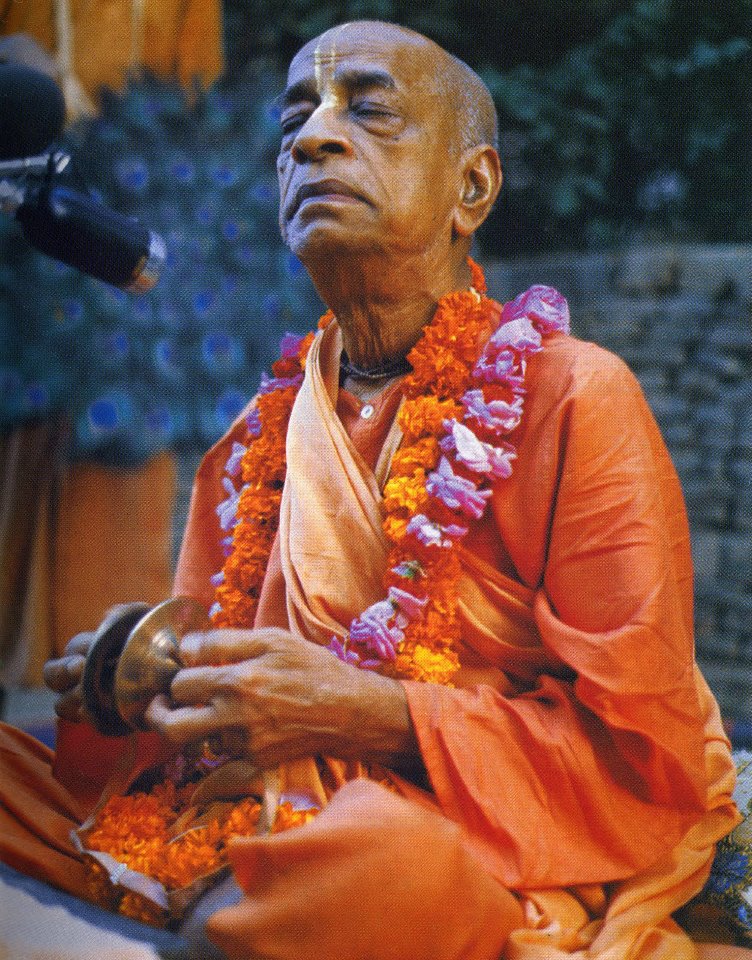
Srila Bhaktivedanta Swami Prabhupada warned of the danger of this many times:
However, one should not imitate the behaviour of an advanced devotee or maha-bhagavata without being self-realized, for by such behaviour one will eventually become degraded.
[Srila Bhaktivedanta Swami: Nectar of Instruction, Verse Five, Purport]
As soon as a foolish disciple tries to overtake his spiritual master and becomes ambitious to occupy his post, he immediately falls down.
[Srila Bhaktivedanta Swami: Srimad-Bhagavatam 5:12:14, Purport.]
When one has attained the topmost position of maha-bhagavata, he is to be accepted as guru and worshiped exactly like Hari, the Personality of Godhead. Only such a person is eligible to occupy the post of guru.
[Caitanya-caritamrta Madhya, 24:330, Purport, citing Padma Purana]

One should not try to be an artificially advanced devotee, thinking, ‘I am a first-class devotee.’ Such thinking should be avoided. It is best not to accept any disciples.
[Caitanya-caritamrta Madhya 7:130, Purport.]
… So better to remain a foolish [simple] person perpetually to be directed by Guru Maharaja. That is perfection. And as soon as he [the upstart] learns that Guru Maharaja is dead, ‘Now I am so advanced that I can kill my guru and I become guru.’ Then he’s finished.
[Srila Bhaktivedanta Swami: Conversation, Aug. 16, 1976, Bombay]
Srila Bhaktivedanta Swami spoke of the fate of imitation gurus:
These rogues are the most dangerous elements in human society. Because there is no religious government, they escape punishment by the law of the state. They cannot, however, escape the law of the Supreme, who has clearly declared in Bhagavad gita (16:19-20) that envious demons in the garb of religious propagandists shall be thrown into the darkest regions of hell. Sri Isopanisad confirms that these pseudo religionists are heading toward the most obnoxious place in the universe after the completion of their spiritual master business, which they conduct simply for sense gratification.
[Sri Isopanisad, mantra 12, purport]
People pose themselves as pure devotees for all sorts of exploitative reasons – perhaps for fame or fortune or the seduction of power, having people worship them etc. Lord Jesus Christ called such people “wolves in sheep’s clothing.” And such a person is always the most empty inside. A student or disciple of a bona fide spiritual master has a responsibility to pass on what they have heard and clearly understand, but they should never pretend they are more advanced than they are, or allow others to think they are pure when they are not. This destroys a person’s spiritual life.
Only a person who is tasting the happiness of love for Krishna and feeling lower than the straw in the street can be worshipped by others and not be seduced and destroyed by this adoration – because they are protected by their humility and have no need for anything other than their love for Krishna. They simply pass on the love and respect others place on them by genuinely feeling it is Krishna who they are worshipping. He is allowing me to represent Him, but they are actually worshipping Krishna. And he feels that all of his success, anything he has which is worthy of worship, is only the mercy of his spiritual master. So the worship of a pure devotee is passed up the chain of disciplic succession.
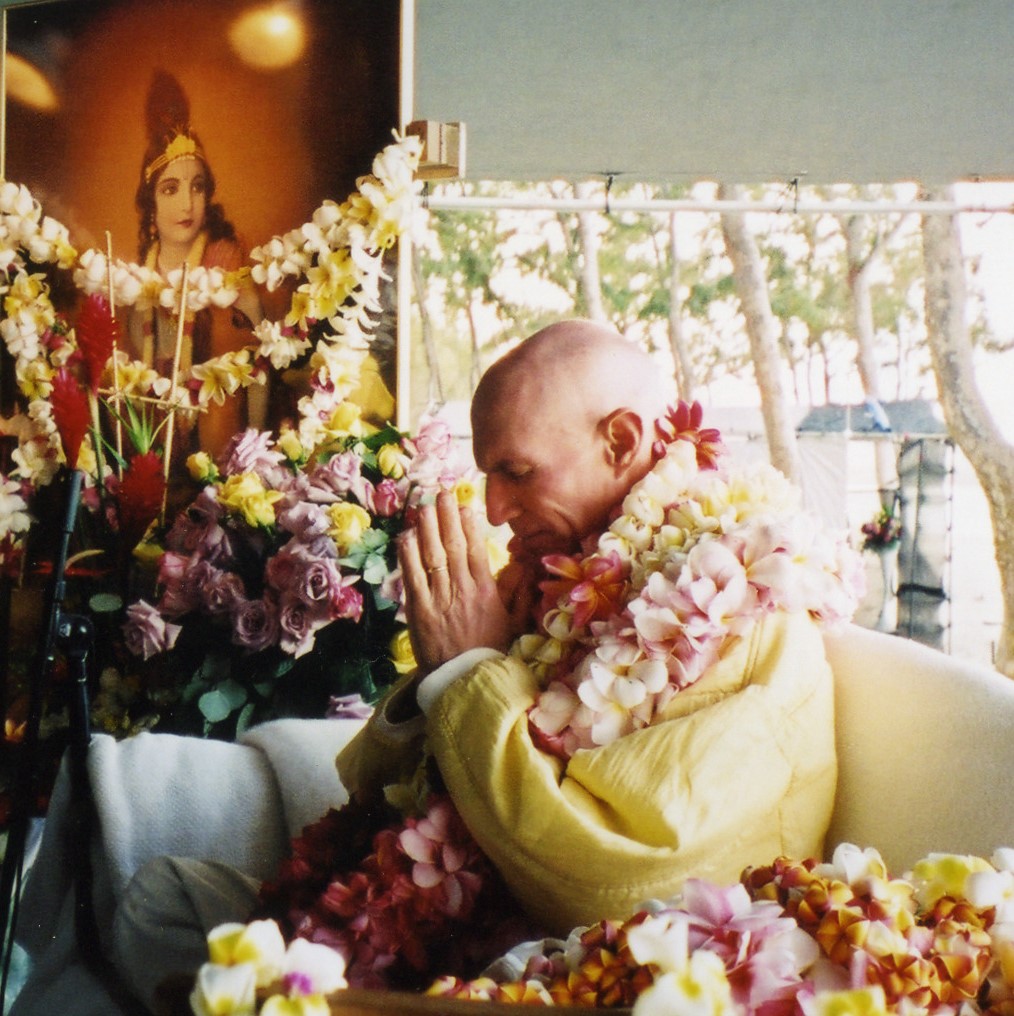
Srila Bhaktivinoda Thakur prayed to his spiritual master:
Your mercy is all that I am made of.
The devotee never takes any credit for what he does or achieves, but simply sees it as the combined mercy of Krishna and Gurudeva. Without being grounded by this humility, a person is seduced and destroyed by others’ worship and respect, and will simply mislead others. A conditioned soul, is covered by four defects: 1. he must commit mistakes 2. to be illusioned 3. cheating propensity 4. Imperfect senses. A real saint, a real spiritual master, is an enlightened, unconditional lover of God. Such a rare and wonderful personality is totally free from doubt and illusion and without these four defects. Others, who pose as spiritual masters without being on the platform of uttama adhikary, are simply cheating and destroying the spiritual lives of themselves and others. We are the most fortunate if we have been given some vision by Krishna as to who is His representative in this world. So we should try to share this with others.
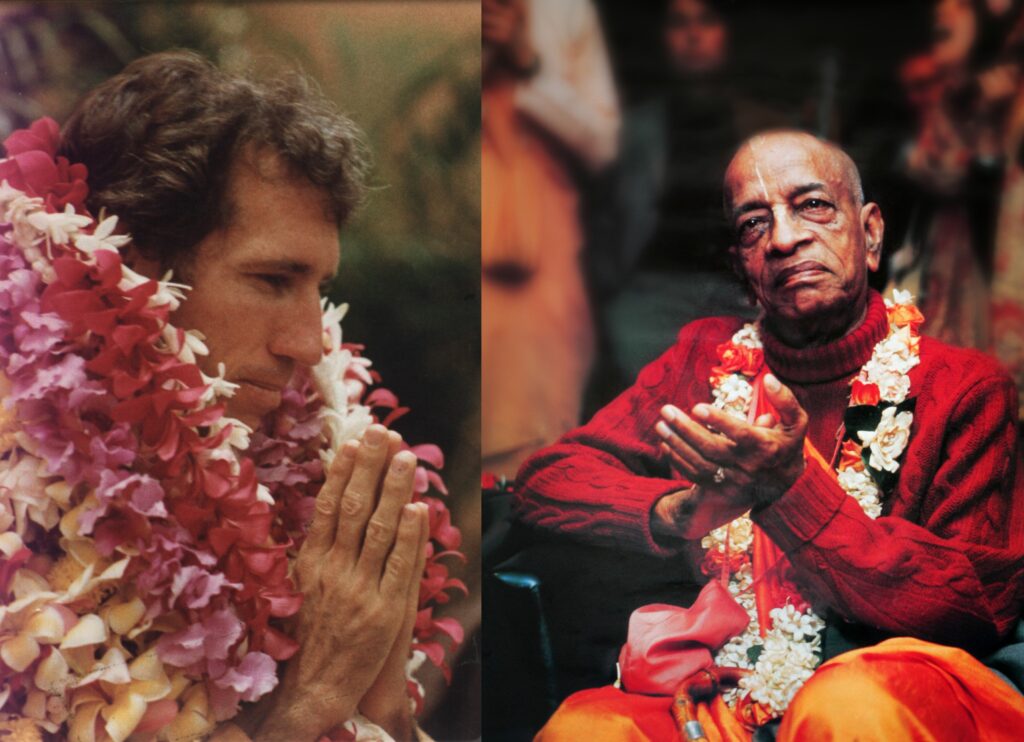
As far as giving Krishna to others is concerned, we should be careful to only pass on what we have properly heard and understood, without throwing in our own ideas and speculations. It is very important that we don’t try and say too much too soon or be fanatical. As we make gradual progress, it becomes easier to know what to say to whom. We should not throw our pearls before swine, as Jesus said, or they will trample them under their feet. Not that we see others as swine – this is of course not what Jesus meant – but saying too much when someone is not ready is counter-productive, as what is said will be brushed off or misunderstood.

The secret of successful preaching is to actually care about the well-being of the people you are trying to help. Sometimes, it is best to be a good listener rather than a great preacher. If people feel that we are not interested in them, in getting to know them, they will not trust us or see us as a friend. The first thing we need to do is establish a relationship of trust and care. I am not talking about a technique here, I am talking about genuinely caring for others. The more advanced we are spiritually, the more we are able to have genuine concern and love for others.
Sometimes, seemingly mundane conversation is actually non-different from speaking Bhagavad-gita – if it is done with the aim of making friendship, so that down the track, when they are more purified by the holy names, they will have genuine spiritual curiosity and appreciation for the philosophy. It is an offence against the holy name to preach its glory to the faithless. So it takes a lot of patience and tolerance to drip feed those who are not hungry to hear the philosophy. Over the years I have seen many fanatics blow people away by saying too much too soon. I have done this myself. It can mean we are on a bit of a guru trip and are insensitive or don’t really care that much about the person we are speaking to. Everyone travels this road at their own speed, and as much as we may want to – for their own benefit – it is not up to us to hurry them along.

Putting Krishna First
There is a great paradox in spiritual life: that a person cannot be truly happy until he gives up the desire for his own happiness. There is the story given of Krishna’s servant Daruka, who was fanning Him. He felt such happiness in performing this service that he would enter into ecstatic trance and would be stunned and stop fanning Krishna as the symptoms of ecstasy overtook his body. But this would greatly disturb him, as it meant he was not performing his service, so he would try and not feel ecstasy as it interfered with his ability to serve. But the more he tried selflessly to not feel ecstasy, the more ecstasy he felt, as Krishna became increasingly pleased with him.
Personally, I look for my own happiness most of the time, and only rarely do I put Krishna’s happiness first. Making Krishna first in our life is not something we can do as our knowledge increases or our determination increases. It is only something we can do as our love increases. So there are no shortcuts or secret ways to get to this position where Krishna’s happiness is everything and our own happiness is nothing. We must follow the process of purification, chant the holy names, hear from and worship the pure devotee, pray for his help and endeavour to patiently serve as selflessly as we are able. We should actively cultivate the desire to serve with spiritual love. If we do these things we are promised success because of the mercy and well-wishes of Krishna’s selfless devotee. Fortunately, Krishna wants us far more than we may want Him, and His help is always there if we care to seek it out in prayer.
As long as we have our own will and desires separate from Krishna’s interest we will always be in anxiety, because we are not all-powerful. Our will is not always done. But if we dovetail our will and desires with Krishna’s will, then we will always be satisfied, because Krishna’s will is always done. The devotee simply does his best to serve and leaves the outcome up to Krishna. In Bhagavad-gita, this is called “not being attached to the fruits of our actions.” As long as we are attached to the fruits of our actions, we are bound by the law of karma. When we act out of selfish desire [materially] we must accept a material reaction – good or bad karma. When we act for the pleasure of Krishna, there is no material reaction because we are acting on the transcendental plane. So depending on our consciousness – our motivation – our actions are either binding or liberating.
In the metaphorical story of Adam and Eve, they ate the apple from the “tree of knowledge of good and evil” – in other words, they were trying to enjoy the fruits of their actions. The tree is the material body with its senses which experience pleasure or pain due to our good or bad karma. They became envious of Krishna [tempted by the serpent] and this made Adam and Eve [all of us] fall from Paradise. The message is we are all here in the material world because we desire our own happiness rather than being in our natural condition of simply desiring Krishna’s happiness. When this mentality is changed we are in the spiritual world.
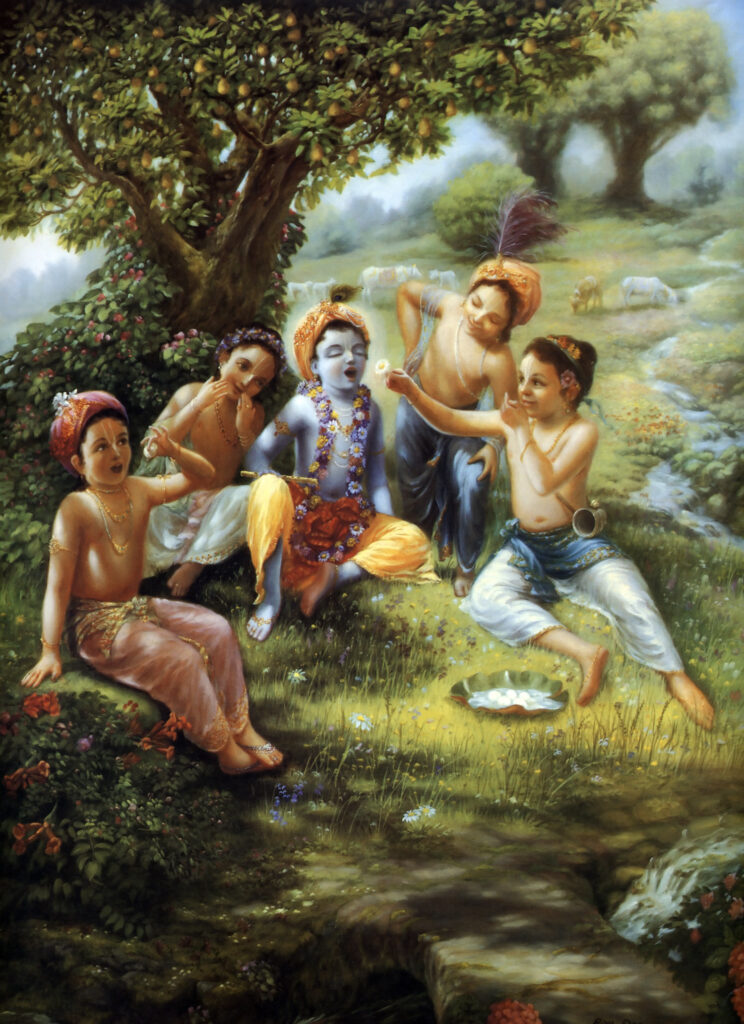
Jesus said “the kingdom of God is at hand” – not far away. Srila Bhaktivedanta Swami has said “devotional service to God and the kingdom of God are non-different.” So it is a matter of gradually changing our consciousness from being a self-centred imitation supreme enjoyer to being a selfless servant of the real Supreme Enjoyer. Lord Jesus prayed in The Lord’s Prayer:
… Hallowed [holy] be Thy Name. Thy kingdom come, Thy will be done on earth as it is in heaven.
Jesus prayed and desired simply to do the will of Krishna. And the very first thing he established in the Lord’s Prayer was that the Lord’s name was hallowed or holy – transcendental and completely spiritual. So this is a good hint as to how to come to that state where our will is dovetailed with Krishna’s will. Lord Chaitanya prayed:
Your Holy Name alone can render all benediction.
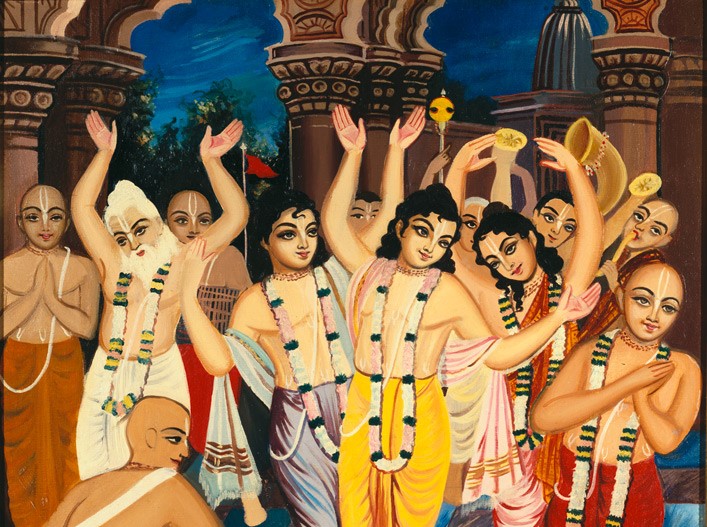
And chanting the holy name will lead us to the point where our selfish desires have gradually fallen away and our only desire is to serve Krishna without self interest. This is called unconditional love, and it is described by Lord Chaitanya in His fourth and eighth prayers:
O almighty Lord, I have no desire to accumulate wealth, nor do I desire beautiful women, nor do I want any number of followers. I only want Your causeless devotional service in my life, birth after birth.
I know no one but Krishna as my Lord, and He shall remain so even if He handles me roughly by His embrace or breaks my heart by not being present before me. He is completely free to do anything and everything, but He is always my worshipful Lord, unconditionally.
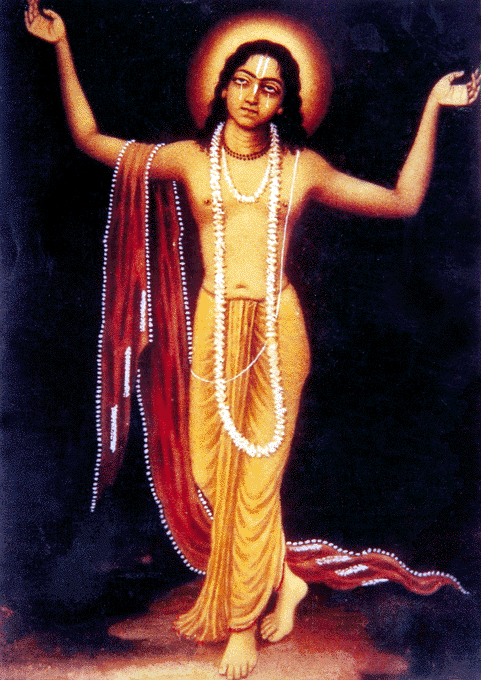
Lord Chaitanya paints a picture here of perfect and selfless spiritual love. This is meant to be our goal. We don’t have to be greatly renounced learned scholars. All we have to be is sincere, and Krishna and guru will give us their blessings and purify our hearts. Along the way our happiness will increase as our selfish habits and desires fall away.
But we will never be fully happy, fully satisfied until we lose all false-self interest, because our real-self interest cannot be separated from our swarup – our spiritual identity and relationship as the eternal servant of Krishna in a particular mood. This is who we really are, so it is our natural state. So the unhappiness, the material anxiety and emptiness we experience as a conditioned soul is also Krishna’s mercy and acts as a reminder that we are not yet in our natural condition, just like the symptoms of a disease motivate us to approach a healer and seek a cure.


Leave A Reply